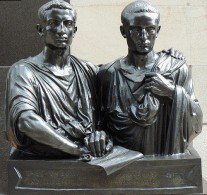NO BLOGS ):
-Multiple chose
25-30 questions
-Essay
3 choices
Probably about Socrates
Plato's cave
Mostly on Class Projects :
Greeks Army, Battle
What is a hiaplite? Greek soldiers
What is the formation called? phananx
Some of the Greek battles? mostly fought Persians (Marathon, Themerpliy, Straight Selmonas)
Plennitsonian War
How long did the Plensican War last? 27 years
How who? Sparta at Slicly
A key factor that cause the war?
How were the Athenian going to fight this war? The wall and at water
Where did it go wrong? When the plague came from cargo
What happened when the plague came? Pericles, his sons, 2/3 people
Math and Science
What are two important names? Arctiemitles, Pythias
Poets and Poetry
Who were the two main poets? Homer and Saffo
Drama
What kind of types were they? Tragedy, Comedy, Sader
Where did they go see plays? It was semi-circular, seats carved out of the hill
Skene was a back wall behind the stage
There wasn't anything like this in the world
Pericles
What were his goals? His wanted to glorify Athens, strengthen democratic, expand the empire
The center of town where people discussion in - Agora
Parthenon
Built by Pericles
Frieze - regular people carved into rim of the Parthenon
Statue of Athina - in the middle
Built of the Acropois so everyone could see it
Built in the Doric style - first example
Aricthure - PICTURES
What were the styles? Doric - basic, Oxic - little more fancy, Corinthian - very fancy
Trial of Scrates
Charged with corrupting the youth minds and going against the gods
How did he die? Drank poison hemlock
Olympics
First games were held in 756 B.C.
Only free men who spoke Greece were allowed to precipitate
No women came precipitate or watch
Boxing, racing, etc.
Hoplitodrmos - event that you run - extra credit?
Philosphery
In order - Socrates, Plato, Artistotle
Scoatic Method - opinions
Plato - found a school called the Acemdey
Plato wrote Dialouges









